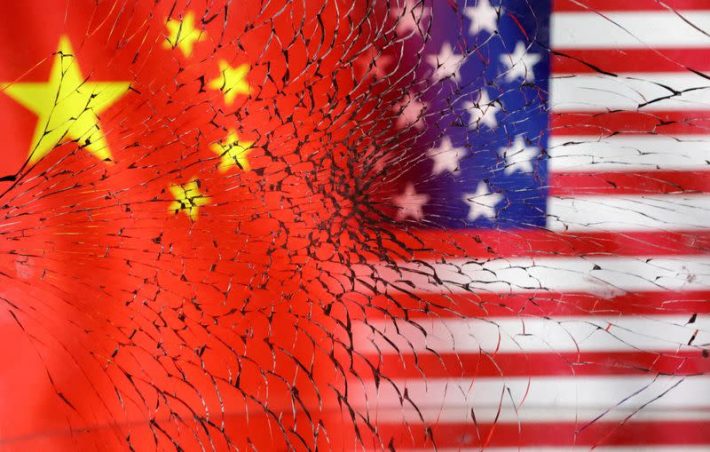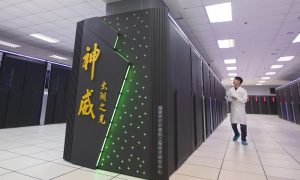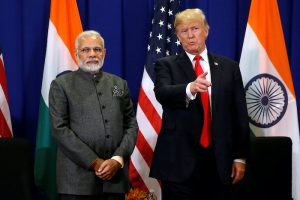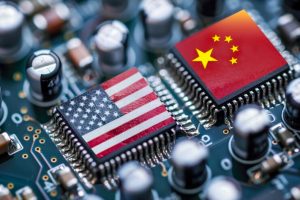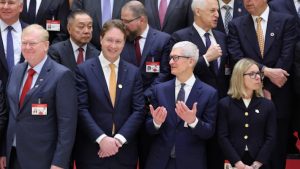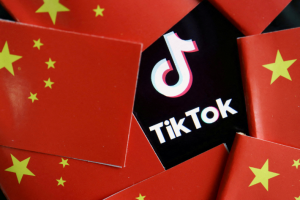Trade relations between the US and China have become more tense, with both sides ramping up rhetoric in recent days after Beijing’s apparent rejection of US concerns about production ‘overcapacity’.
A day after President Joe Biden threatened to triple the tariffs on imports of Chinese steel and aluminium, China has struck back in two ways.
On Friday, China announced “anti-dumping penalties” of more than 40% on imports of propionic acid, a chemical from the US used in foods, pesticides, pharmaceuticals and drug intermediates.
ALSO SEE: Study Shows Half of China’s Big Cities Sinking, Rising Seas Risk
The South China Morning Post described this move as “retaliation against similar action from Washington as tensions build in bilateral trade”.
From Saturday, the Ministry of Commerce will require deposits to Chinese customs from firms importing the chemical from the US. The penalties would add 43.5% to the cost of such imports, it said.
Meanwhile, Apple said on Friday it had removed WhatsApp and Threads from its App Store in China.
The US tech giant said it took that action after the Chinese government ordered it to cut the messaging apps because of national security concerns.
China is aware that a whole slather of tougher trade actions could be looming.
On Wednesday, Treasury Secretary Janet Yellen signalled that tariffs on Chinese electric vehicles may be necessary to protect American workers from Beijing’s glut of overproduction.
And the administration also launched an investigation this week into what it said were China’s attempts to dominate the maritime, logistics and shipbuilding industries.
Many experts now think the result of that probe and an ongoing multi-year review of Trump-era trade policies will be even more new tariffs on imports from China.
With the US election getting closer, and polling remaining tight, it’s perhaps no surprise that trade and other serious concerns plaguing bilateral ties are coming to the surface.
‘Strongly dissatisfied’
Liu Pengyu, spokesperson at the Chinese embassy in Washington, said US tariffs embody unilateralism and protectionism.
“Many trading partners of the United States, including China, are strongly dissatisfied with the United States’ frequent use of national security, non-market behaviour, overcapacity and other reasons to impose restrictions and politicize trade issues,” Pengyu said in a statement on Wednesday in response to the proposed steel tariffs.
Biden’s decision to ramp up tariffs this week suggests a hawkish trade climate heading into the 2024 election as Biden and his Republican rival, Donald Trump, see a tough-on-China stance as a part of the road to victory, particularly in rust-belt states like Michigan and Pennsylvania.
Trump has proposed 10% across-the-board import tariffs if he were to return to the White House.
He also proposes phasing out Chinese imports of goods such as electronics, steel and pharmaceuticals over four years and wants to prohibit Chinese companies from owning US infrastructure in the energy and tech sectors.
Some 41% of Americans named China as the greatest US enemy in a Gallup poll released in March, making it the top perceived adversary for the fourth straight year, the polling group said.
“China is inevitably getting drawn into what’s likely to be a little bit of a chaotic cycle. And I think really, right now, we’re just seeing the beginnings of that,” Allen Carlson, a Cornell University professor and expert on US-China relations, said.
White House officials dismiss the idea that politics is at play, even as Biden trumpeted the proposed steel tariffs in an emotional anti-Trump speech at the United Steelworkers union headquarters in Pennsylvania.
Flood of low-cost imports feared
Instead, administration officials say they fear a flood of low-cost exports from China is jeopardizing billions of dollars in tax incentives secured by Biden to anchor industries like solar, wind and electric vehicles in the United States.
China’s slow-growing economy is forcing manufacturers to double down on exports to offset weak domestic demand growth, causing China’s manufacturing trade surplus to surge to record levels, administration officials say.
Double sided-solar panels, known as bifacials, provide an example of the administration’s concerns. The administration granted an tariff exemption to China until 2026 to help promote solar power in the US, but now officials are expected to lift the ban and impose tariffs after cheap cells flooded the US market
South Korea’s Hanwha Qcells asked the administration to lift the ban to protect a pledged $2.5 billion expansion of its US solar manufacturing presence against competition from cheaper Asian-made products.
Biden aides said their administration’s policies differed from Trump’s in key respects, including being narrowly targeted to specific industries and products – which could lower the odds of strong retaliation by China and other foreign governments.
The steel and aluminum proposal, for instance, would only target $1 billion in goods versus the hundreds of billions implicated by Trump’s broader tariffs, a senior administration official said.
Strong US policy against China is one of the rare issues that has strong bipartisan support across the country.
“Everybody’s anti-China these days and it’s reflected in public opinion,” Bill Reinsch, a senior adviser at the Center for Strategic and International Studies, said.
- Jim Pollard with Reuters
ALSO SEE:
US ‘Pressured’ Mexico to Reel Back China EV-Maker Incentives
Biden to Propose Tripling Tariffs on Metal Products From China
US Set to Restore China Solar Tech Tariffs After Korea Firm Plea
US Reviewing Trade Sanctions to Tackle China Supply Chain Threats
China’s Theft of Trade Secrets Our No1 Concern: US Patent Chief
US Lawmakers’ Fury Over Huawei’s Intel AI Chip-Powered Laptop
Excess Capacity Claim is Wrong, We’re More Competitive: China




